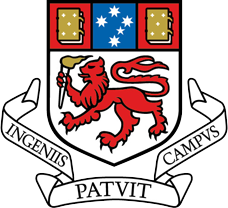Tasmania University

Coat of arms of the University of Tasmania
|
|
| Latin: Universitas Tasmaniensis | |
| Motto | Ingeniis Patuit Campus |
|---|---|
|
Motto in English
|
The Field is Open to Talent |
| Type | Public |
| Established | 1846 (as Christ College) 1890 (University status) |
| Endowment | A$561 million (2014) |
| Chancellor | Michael Field |
| Vice-Chancellor | Peter Rathjen |
| Visitor | Governor of Tasmania (ex officio) |
|
Academic staff
|
1,188 (2015) |
|
Administrative staff
|
1,541 (2015) |
| Students | 33,879 (2014) |
| Undergraduates | 27,880 (2014) |
| Postgraduates | 5,999 (2014) |
| Location |
Hobart, Launceston and Burnie, Tasmania; Sydney, New South Wales, Australia |
| Campus | Urban |
| Student Organisations | Tasmania University Union Australian Maritime College Students' Association |
| Colors | Red Black |
| Affiliations |
ASAIHL ACU |
| Website | utas.edu.au |
 |
|
| University rankings | |
|---|---|
| University of Tasmania | |
| QS World | 370 |
| THE-WUR World | 251–300 |
| ARWU World | 201-300 |
| USNWR World | 366= |
| CWTS Leiden World | 523 |
| Australian rankings | |
| QS National | 20 |
| THE-WUR National | 10= |
| ARWU National | 9-14 |
| USNWR National | 14= |
| ERA National | 11 |
The University of Tasmania (UTAS) is a public research university primarily located in Tasmania, Australia. Officially founded in 1890, it was the fourth university to be established in Australia, although Christ College, which became affiliated with the university in 1929, was established in 1846 and remains the oldest form of higher education in the country. The University of Tasmania is a sandstone university and is a member of the international Association of Commonwealth Universities and the Association of Southeast Asian Institutions of Higher Learning.
The university offers various undergraduate and graduate programs in a range of disciplines, and has links with 20 specialist research institutes, cooperative research centres and faculty based research centres; many of which are regarded as nationally and internationally competitive leaders. The university's Institute for Marine and Antarctic Studies have strongly contributed to the university's multiple 5 rating scores (well above world standard) for excellence in research awarded by the Australian Research Council. The University also delivers tertiary education at the Australian Maritime College, the national centre for maritime education, training and research.
The university is highly regarded for its commitment to excellence in learning and teaching. It was ranked in the top 10 research universities in Australia and in the top two per cent of universities worldwide in the Academic Ranking of World Universities. The university also received more teaching awards than any other Australian university by the Australian Government Office for Learning and Teaching in 2012.
The University of Tasmania was established on 1 January 1890, after the abolition of overseas scholarships freed up funds. It immediately took over the role of the Tasmanian Council for Education.Richard Deodatus Poulett Harris, who had long advocated the establishment of the university, became its first warden of the senate. The first degrees to graduates admitted ad eundem gradum and diplomas were awarded in June 1890. The university was offered an ornate sandstone building on the Queens Domain in Hobart, previously the High School of Hobart, though it was leased by others until mid-1892. This eventually became known as University House. Three lecturers began teaching eleven students from 22 March 1893, once University House had been renovated. Parliamentarians branding it an unnecessary luxury made the university's early existence precarious. The institution's encouragement of female students fuelled criticism. James Backhouse Walker, a local lawyer and briefly Vice-Chancellor, mounted a courageous defence. By the First World War there were over one hundred students and several Tasmanian graduates were influential in law and politics.
...
Wikipedia
